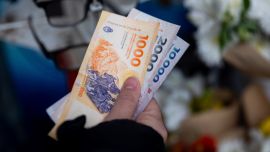The rallies unleashed by Argentina's President Javier Milei’s surprising electoral win were stunning, with bond prices posting record gains and the stock market skyrocketing over 20 percent as investors stampeded back in.
The ebullience was far more subdued when it came to the linchpin of Milei’s plans to remake Argentina’s economy: the peso. As trading wore on Monday, the currency steadily pulled back from its early morning surge to end less than four percent higher – at roughly where it was two weeks ago.
The restrained advance reflects, in part, gnawing doubts that the nation will maintain the currency-trading band that it defended so aggressively in the run-up to the legislative vote this past weekend.
That tether has helped to pull down runaway inflation by keeping the peso from tumbling. But it has come at such a high cost – forcing the government to burn through its reserves to support it and pushing up local interest rates – that analysts speculate the libertarian president will eventually need to widen its trading range or let the exchange rate float freely, just like most other major currencies.
“It’s hard to predict what’s going to happen with the foreign-exchange policy in the short term,” said Robert Koenigsberger, founder and chief investment officer at Gramercy Funds Management. “You could say they bought more time to adjust the currency, or that they just got a better window.”
Argentina officials have repeatedly said they aren’t planning on enacting any changes to the current exchange-rate policy. And the rebound promises to buy Milei time by at least temporarily halting a run on the currency that had cost it hundreds of millions of dollars a day and prompted a US$20-billion rescue by the Trump administration.
But Argentina residents have widely viewed the exchange rate as artificially high. Many have been shifting savings into dollars, anticipating that Milei was delaying any moves until after the election.
“I think they will float at some point soon from a position of strength,” said David Austerweil, emerging-markets deputy portfolio manager at VanEck in New York. “Given how good the election outcome was and how over-dollarised local savers are,” the peso might not devalue shortly after easing the restrictions, he added.
Milei allowed the currency to drop sharply soon after his election in November 2023. Early in his Presidency, investors were optimistic that his brand of budget-and-regulation cutting shock therapy would rejuvenate an economy that’s been plagued by high inflation, currency crises and government debt defaults for decades.
The peso’s current band – which allows for a small, orderly depreciation – was established as condition of a lending agreement struck with the International Monetary Fund in April. But it hasn’t allowed for the peso to weaken enough to reflect Argentina’s still elevated inflation. Maintaining it has periodically required the government draw down its reserves to buy the peso, which has had the negative effect of pushing up local interest rates by pulling liquidity from the financial system.
Milei could seek to adjust the nation’s currency policy while the markets are buoyed by anticipation he will be able to keep pushing through an agenda that has shown some signs of success but has yet to set off the promised economic revival.
On Monday, the price of the government’s dollar-denominated 10-year notes rose as much as 14 cents to 71 cents on the dollar, the biggest jump on record, before ending the day around 69 cents. Stocks saw the biggest one-day jump since Milei’s victory two years ago.
The peso was also affected by doubts about whether the US will now pull back from the interventions that have supported it. That sentiment was stoked on Monday after US Treasury Secretary Scott Bessent indicated he welcomed the post-election rally as a sign “the market is going to take care of itself.”
Jeff Grills, head of emerging-market debt at Aegon Asset Management, said the questions about the currency could likely curb further gains in the bond market until they are answered. On Tuesday, bonds were largely unchanged, signalling a pause after the previous day’s surge.
“They need to adjust the band set with the IMF to allow more room to have the peso depreciate and maybe increase the rate of the band depreciation,” he said. “Until we know that, bonds will be range-bound.”
by Nicolle Yapur, Vinícius Andrade & Giovanna Bellotti Azevedo, Bloomberg





















Comments